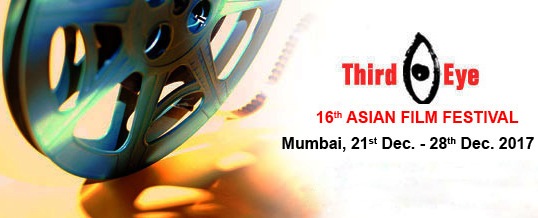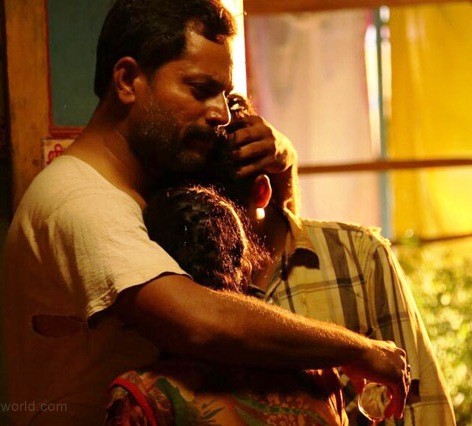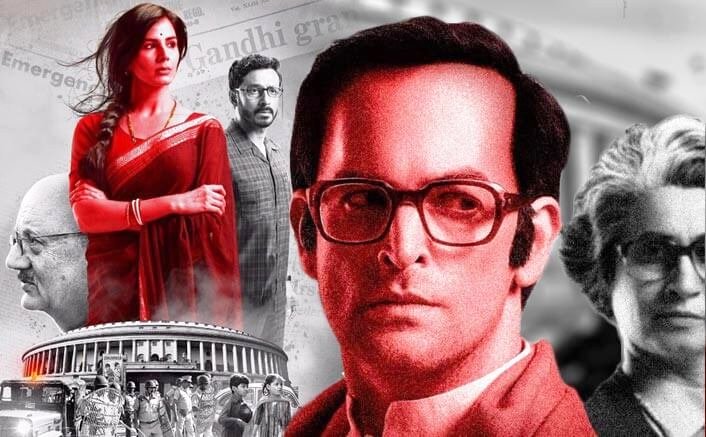|
|
||
|
Pro Tools
FILMFESTIVALS | 24/7 world wide coverageWelcome ! Enjoy the best of both worlds: Film & Festival News, exploring the best of the film festivals community. Launched in 1995, relentlessly connecting films to festivals, documenting and promoting festivals worldwide. Working on an upgrade soon. For collaboration, editorial contributions, or publicity, please send us an email here. User login |
16th Third Eye Asian Film Festival: VII
16th Third Eye Asian Film Festival: VII TEAFF was organised by the Asian Film Foundation and P.L. Deshpande Maharashtra Kala Academy, and co-organised by Prabhat Chitra Mandal and Akhil Bharatiya Marathi Chitrapat Mahamandal. An annual event, it is supported by Department of Culture, Government of Maharashtra. Screenings were held at Ravindra Natya Mandir Mini Auditorium, Mumbai, which has been the venue for the last few years. In my last instalment, I covered two Marathi films. Today, we will talk about one Marathi and one Hindi film. That will still leave four films not yet covered, and those will feature in the next piece.
Copy, 2017 Directors Hemant Dhabade and Dayasagar Wankhede have made a hard-hitting documentary-like feature about corruption in, and commercialisation of, the education system in rural Maharashtra. It has a crusading zeal that is palpable throughout the 112 minutes of running time. The story and screenplay have been written by Rahul Salve, along with the director duo. Wankhede has written the dialogue. Choosing a real background, the film was shot in Kasu village, in Pen, close to Mumbai. Missing school-teachers who make lots of easy money by teaching at coaching/tuition classes while playing truant during school-hours, putting careers of an entire generation of students at stake, forms the subject of this purposeful drama. Politicos run educational institutions funded by government grants, and a large portion of such funds is misappropriated. The dysfunctional or barely functional school plays havoc with the lives of students, since there is no other school in the vicinity. But to keep the wheels in motion, students are allowed, even encouraged, to cheat at examinations, copying the answers to the questions from, each other and from text-books. Passing examinations is all that matters. Not surprisingly, the school boasts of 100% results. One teacher runs tuition/coaching classes, where he offers large sums of money to his colleagues, to persuade them to keep away from their school job. His logic is that the school management keeps defaulting on salaries, up to a whole year, so the teachers are justified in finding alternate sources of income. Two idealistic teachers stand-up against this crass commercialisation of the education system, and use fasting and satyagraha (non-violent protests, popularised by Mahatma Gandhi), in which they are joined by two students. Popular comedian Anshuman Vichare, who acted in Shwaas, plays the role of a bearded teacher, with high moral standards, for a change. It is also a welcome change for Jagannath Nivangune, who has been typecast as a police officer, being cast here as the other crusader, along with Vichare. Both do a creditable job. Milind Shinde plays the unscrupulous opportunist who runs the coaching class, looking the part and apparently enjoying himself. Kamlesh Sawant, Anshuman Vichare, Jagannath Nivangune, Vipul Salunkhe, Anil Nagarkar, Kailas Waghmare and Poonam Waghmare provide adequate support. Not an ideal package, Copy is at least an honest attempt at addressing a burning issue, with depth in writing. (The schedule and the brochure mention only Dayasagar Wankhede as director. Wankhede clarified that this was a printing error and that the film was co-directed by Hemant Dhabade). Rating: ***
Indu Sarkar, 2017 One would have expected Madhur Bhandarkar to call his 2017 vehicle 'Politics'. It is about politics. In the tradition of Chandni Bar, Satta, Traffic Signal, Fashion, Page 3, Corporate, Jail and Calendar Girls, naming it Politics conforms to the pattern of deriving a title from the milieu. Bhandarkar’s films do have the settings the titles suggest, but are usually the stories of women and men who populate such realms. Chandni Bar was more the tale of its protagonist than the bar and the historical timeline of the religious riots in Mumbai. So, come 2017, Bhandarkar decides to name his film after his protagonist, who is an indirect victim of the political scenario in New Delhi circa 1974-77. Those were the days of Indira Raaj (rule), Indira Gandhi being the iron-fisted Prime Minister of India. A series of events across the country prompted Gandhi to Impose Internal Emergency, suspending most constitutional and human rights, and a gunpoint regime was made operational. There were many benefits of a policy of zero-tolerance towards hoarding, absenteeism, train delays, profiteering and more, which were weighed against the rule of diktats promulgated by Gandhi’s younger son Sanjay, the most draconian of which involved razing dawn of slums in New Delhi and a nationwide forcible sterilisation of men of all ages, in an attempt to stem population growth. Bhandarkar, now 50, was a little boy during the emergency period, so his story is not a memoir, by any yardstick. Anil Pandey, who worked with him in Dil Toh Baccha Hai and Calendar Girls, is also a post-emergency citizen, as is the dialogue writer, Sanjay Chhel. So, the film is fiction meets research. Yes, the negatives of the emergency constitute a significant part of the film, though with a name like Indu Sarkar, it was only logical to expect an indictment of Indu (Indira)’s Sarkar (government). Very early in the film, Bhandarkar makes it clear that his leading lady is an orphan by the name of Indu, who stammers and writes poetry, and Sarkar is her married surname. So, Indu Sarkar is not about Indira’s government. Indira Gandhi, as played by an actress, is seen for about five seconds, at the end, and has no words to speak. By contrast, there is ample footage devoted to Sanjay Gandhi, again played by an actor. Barring occasional flashes of inspiration, and some good lines, the fictionalised re-enactment of the dark period is lack-lustre. Kirti Kulhari (Shaitaan, Jal, Pink) as Indu Sarkar struggles to make the stammering work for her, and only barely succeeds. Tota Roy Chowdhury (Shubho Mahurt, Chokher Bali, Kahaani 2: Durga Rani Singh) as Navin Sarkar comes with impeccable credentials, only to get wasted. Neil Nitin Mukesh (Johnny Gaddaar, New York, 7 Khoon Maaf, Jail) does look a lot like Sanjay Gandhi. His scenes have a uni-dimensional look about them. Rashmi Jha as Farzana (named to rhyme with Rukhsana; Rukhsana Sultana was reported to be very close to Snajay) plays along like a moll, the role having been written more literally than cinematically. Sheeba Chaddha as Mekhla and Manav Vij as Inspector Sodhi draw appreciation, while Mohan Kapoor as Sahani and Parvin Dabas as an Intelligence Bureau Officer are stock characters. Casting artistes of the calibre of Anupam Kher as Nanaji Pradhan and Zakir Hussain as Inspector Mishra is a colossal waste. Lastly, Supriya Vinod, as Indira Gandhi, comes just before the credits roll. Of some curiosity value is the rendering of his father, Aziz Nazan's iconic qawwali, ‘Chadhta sooraj dheerey dherey dhalta hae,” by Mujtaba Aziz Nazan, retained in full and picturised with the screen representation of Sanjay Gandhi in audience. Stray incidents and allegories do not add up to an impressive whole in Indu Sarkar. Rating: ** 07.01.2018 | Siraj Syed's blog Cat. : Akhil Bharatiya Marathi Chitrapat Mahamandal Ambiance Anil Nagarkar Anil Pandey Anshuman Vichare Anupam Kher Asian Film Foundation commercialisation corruption Dayasagar Wankhede Department of Culture education Government of Maharashtra Hemant Dhabade Indira Gandhi internal emergency Jagannath Nivangune Kailas Waghmare Kamlesh Sawant Kasu village Kirti Kulhari Madhur Bhandarkar Manav Vij Milind Shinde Mohan Kapoor Mujtaba Aziz Nazan mumbai Neil Nitin Mukesh P.L. Deshpande Maharashtra Kala Academy Parvin Dabas Pen Poonam Waghmare Prabhat Chitra Mandal Rahul Salve Ravindra Natya Mandir Mini Auditorium Rukhsana Sultana Sanjay Chhel Sanjay Gandhi satyagraha Sheeba Chaddha Supriya Vinod Tota Roy Chowdhury Vipul Salunkhe Zakir Hussain
|
LinksThe Bulletin Board > The Bulletin Board Blog Following News Interview with EFM (Berlin) Director
Interview with IFTA Chairman (AFM)
Interview with Cannes Marche du Film Director
Filmfestivals.com dailies live coverage from > Live from India
Useful links for the indies: > Big files transfer
+ SUBSCRIBE to the weekly Newsletter Deals+ Special offers and discounts from filmfestivals.com Selected fun offers
> Bonus Casino
User imagesAbout Siraj Syed Syed Siraj Syed Siraj (Siraj Associates) Siraj Syed is a film-critic since 1970 and a Former President of the Freelance Film Journalists' Combine of India.He is the India Correspondent of FilmFestivals.com and a member of FIPRESCI, the international Federation of Film Critics, Munich, GermanySiraj Syed has contributed over 1,015 articles on cinema, international film festivals, conventions, exhibitions, etc., most recently, at IFFI (Goa), MIFF (Mumbai), MFF/MAMI (Mumbai) and CommunicAsia (Singapore). He often edits film festival daily bulletins.He is also an actor and a dubbing artiste. Further, he has been teaching media, acting and dubbing at over 30 institutes in India and Singapore, since 1984.View my profile Send me a message The EditorUser contributions |






























